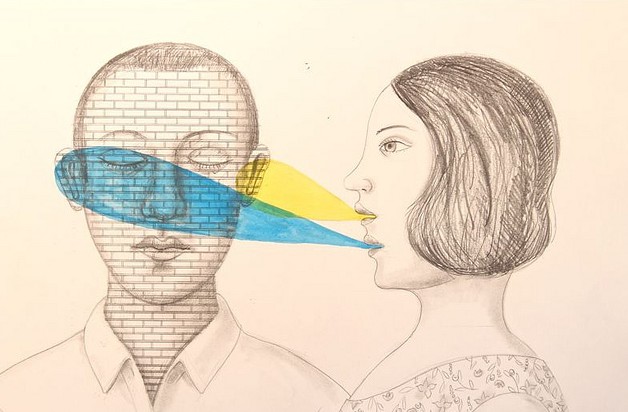We all know that friend: we meet him or her for a meal and find ourselves a bit pressured.
It might be hard to put our finger on why we feel uneasy the whole time, but one thing we know for sure: after the meeting, we are tired, drained, exhausted and question whether we want to see this friend again.
Does that sound familiar?
Our friend is definitely not a bad person, nor are they out there to harm us. They are simply dependent on us to verify their worldviews and beliefs. They don’t feel like they’re enough on their own and need additional energy—in the form of emotions, reactions or support from others in order to sustain themselves. How does this play out?
I was with a friend who often told me fairly dramatic stories about things that happened to her. So I listened with compassion and offered an ear to hear her out. But it didn’t feel like being present, listening and an empathetic friend was enough for her. It became clear to me that she was fishing for a certain response and wasn’t getting it. She wanted me to side with her, to tell her, “Oh poor you. You poor thing. Yes, they definitely wronged you. You are right.” Since I didn’t agree with her point of view and didn’t want to help with her victimization, I stood my ground and just listened.
And you guessed it! The stories are retold and the question reemphasized: “Don’t you agree? Don’t you think that they should assume more responsibility? What he did was wrong, right?”
At this point, we become exhausted and bored, and the awkwardness of being cornered sets in. Should we just agree so they are quiet and get what they were looking for, or should we stick it out? How can we feel comfortable in such a situation?
Whether it’s our friends, partners, colleagues or family members who we love, when it comes to the relationship and our social interactions, we feel like we are there to serve one purpose: make the drama already bigger than it is, confirm what they already feel and think, and tell them that they are right.
If you are stuck in such a draining relationship, what can you do? How can you practice self-love and self-respect?
Here are some authentic and truthful tricks that will give you peace of mind and help you be at ease in these social situations, even those ones that are uncomfortable.
1. Recognize and honor your full presence:
Often in situations that make us uncomfortable, we begin to get lost in the environment in order to control or change it and we forget ourselves and what we want or need in that moment. If you find yourself in a draining relationship, take a deep breath and recognize that you are there. Observe what is happening on the outside and also have an equal awareness of just yourself. How do you feel? What do you need? Then we can proceed, not just through pure reaction, but with a full awareness of ourselves and our desires.
2. See beyond their story:
We can get caught up with other people’s stories and drama, but what is actually going on? Behind the dramatic story or requesting our sympathy, is our loved one asking for help? Are they in need of a hug or do they want to know that someone is there? Do they want to be seen and accepted? Let us listen and observe beyond the words that are spoken and investigate the real reason why the exchange is happening. What are they trying to tell us?
3. Empathize.
To build upon the previous point, let us be empathetic. Let us see the human in the other person; look into their eyes and connect with them. Even if our loved one is spinning in their own stories (which are possibly formulated in their heads), we can still be empathetic about how they feel. We may not wish to pity them or reconfirm the things they want to hear, but we can be fully present. We can breathe with them and fully accept how they feel and what they are going through in that moment.
4. Grounding: know what is yours and what is theirs.
Do you know that feeling when you have taken on someone else’s burden, pain, worries or emotions? This can easily happen if we don’t have a clear boundary between our own emotions and those of someone else. The best way to gain clarity is to be strongly grounded. Being grounded means that we steady, centered in ourselves and not lost and pulled to the outside in every direction because we aren’t present. Similar to step one, take a deep breath and bring your awareness back to you: your belly, breath, body or heart. Keep breathing and focusing on yourself until you feel anchored and have a good sense that you are the observer. You are the one absorbing, interpreting and understanding what is happening on the outside.
From this grounded stance, then listen to your loved one. You will notice that it will be much clearer when you have a sense of yourself, whether an emotion is yours or someone else’s. Seeing this distinction doesn’t mean that we will be disconnected from the other person. By being grounded, we are present and can then choose what we wish to carry or hold inside of us (emotions, feelings, thoughts) and what we wish to let go of.
5. Understand that a wish is not a requirement.
When we find ourselves in an awkward social situation, sometimes we feel like we are forced to do what the others ask in order to make the situation flow more smoothly. But do we have to? Even when faced with pressure to respond a certain way, we have a choice. Wishes and suggestions made by another are only invitations. Ultimately, we have to choose what we want and what we wish to do.
If we feel social pressure, that is not a sign that we must give in. In fact, that is a signal that we may be pushed in a direction that we don’t agree with. So breathe deeply, ground yourself, see the other person for who they are and then follow through with what feels right.
6. You are enough.
If our loved one takes one more step and attempts to instill guilt because we’re not doing what they want, know deep inside that you are enough and you have done nothing wrong.
Their reaction is simply displeasure that they didn’t get what they want. Like throwing a temper tantrum, it is simply another expression of frustration. If you have fully embraced all these tips, you might already see through their needy front and see them for who they are. You may feel empathetic for what they are going through, yet have a clear understanding that what they are experiencing is not yours and not for you to carry.
From a young age, we have been conditioned to think that we are not “good” if we don’t do what others say. This belief cannot be further than the truth. By applying these six tips, we can practice self-love and respect ourselves in any relationship, all the while knowing that we are enough and perfect as we are and that we always have a choice.
Author: Natasha Koo
Image: Rick&Brenda Beerhorst/Flickr
Editors: Catherine Monkman; Emily Bartran







Read 3 comments and reply